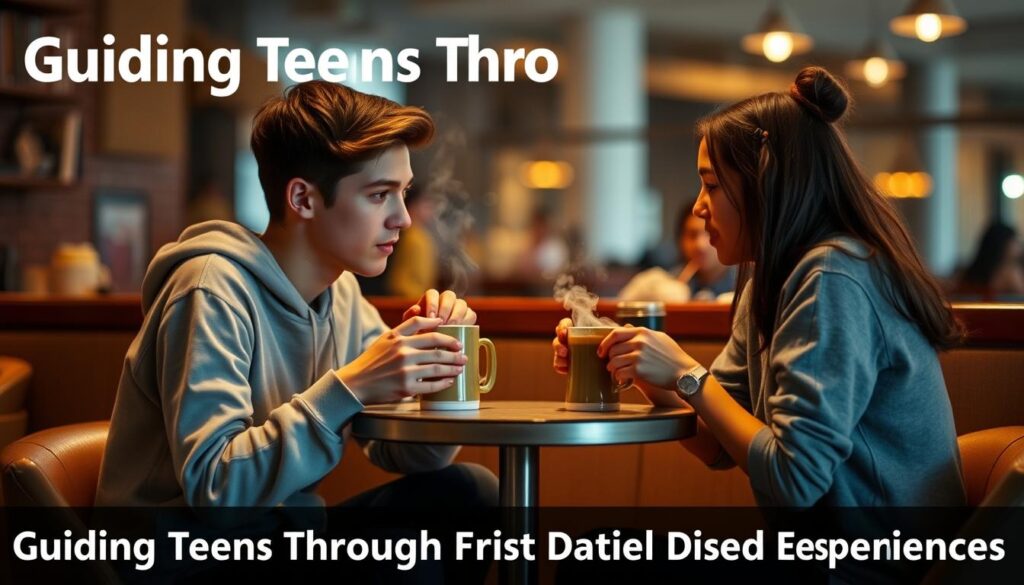Supporting your teenager in the world of friendships and love can be puzzling. You might ask yourself, what’s the secret to helping them form lasting, healthy bonds? It’s vital to offer the right guidance and support in these areas. This way, your teenager can develop key social skills that will serve them well into adulthood. Teen relationship advice is critical, as it greatly affects their emotional and mental health.
When thinking about how to help your teenager, remember that social skills and teens are closely tied. By focusing on teen relationship advice and helping them navigate friendships and love, you’re setting them up for success. Whether you’re a parent, guardian, or teacher, guiding them in these areas is essential for their growth.
Key Takeaways
- Helping teens navigate friendships and romantic relationships is key for their emotional and mental health.
- Teen relationship advice can greatly influence a teen’s ability to form strong, healthy connections.
- Teenagers and social skills are closely linked, and developing these skills is vital for their success.
- Helping teens navigate friendships and romantic relationships requires a supportive and guidance-focused approach.
- By focusing on helping teens navigate friendships and romantic relationships, you can help your teenager develop essential life skills.
- Providing guidance on teen relationship advice can help your teenager build strong, healthy relationships that will last a lifetime.
Understanding Teen Social Development and Relationship Needs
As you move through adolescence, it’s key to see how important social connections are. Navigating friendships in high school can be tough, but it’s vital for your growth. These relationships shape your self-esteem, emotional smarts, and social skills.
When it comes to teenage dating tips, focus on building healthy relationships in adolescence. Healthy relationships offer emotional support, trust, and respect. These are essential for your growth and future connections. Here are some important points to keep in mind:
- Developing emotional intelligence and empathy
- Building strong communication skills
- Learning to navigate conflicts and challenges
Understanding the value of social connections and relationships is a big step. It’s okay to make mistakes and learn from them. It’s all part of growing strong, meaningful relationships.
Building Strong Communication Skills for Better Relationships
As you explore teen friendships and romantic relationships, strong communication skills are key. Guidance for teen friendships and adolescent romance can lay a solid foundation for healthy bonds. It’s about sharing your feelings, needs, and boundaries clearly and with respect.
Active listening, empathy, and knowing how to solve conflicts are vital. These skills help you build deeper, more meaningful connections. This can make your social life richer and improve your emotional health. For example, expressing your emotions well can prevent misunderstandings and help solve problems faster.
Some important parts of strong communication skills include:
- Practicing active listening to understand the other person’s perspective
- Being empathetic and trying to see things from their point of view
- Expressing your feelings and needs clearly and respectfully
- Developing conflict resolution strategies to navigate disagreements

By focusing on guidance for teen friendships and adolescent romance, you can improve your communication skills. Remember, effective communication goes both ways. It’s important to be open, honest, and respectful in your interactions. With practice and patience, you can become a skilled communicator and build relationships that bring joy and fulfillment to your life.
Recognizing Healthy vs Unhealthy Friendship Patterns
As you explore the world of teens and peer relationships, it’s key to know the difference between good and bad friendships. Good friendships are based on respect, trust, and support for teenage friendships. They can make your life better by teaching you important social skills and helping you find your identity.
A good friendship means you can talk openly, understand each other, and feel safe sharing your feelings. You and your friends support each other’s dreams and celebrate each other’s wins.

But, bad friendships can hurt your feelings and well-being. Look out for signs like being too clingy, always being critical, or pushing you to do things that aren’t safe. If a friendship makes you feel down or goes against your values, it might be time to think about changing it.
- Respect and trust are essential components of a healthy friendship
- Open communication and empathy are critical for building strong relationships
- Supporting each other’s goals and aspirations is vital for a positive and healthy friendship
By knowing the signs of good and bad friendships, you can choose better for yourself. Remember, support for teenage friendships is important. Being around positive friends can really shape your life in a good way.
Supporting Teens Through Social Media and Online Relationships
As a parent or guardian, you have a big role in helping teens deal with friendships and love in the digital world. Social media and online platforms test their social skills. It’s key to guide them on how to communicate online safely and balance their digital and real-life connections.
Online relationships need careful handling. It’s vital to talk about privacy and cyberbullying awareness. You can teach your teen about the effects of their online actions on relationships. They’ll learn to handle these issues better.
- Being cautious with personal information online
- Recognizing online harassment and knowing how to report it
- Setting boundaries and maintaining a healthy balance between virtual and real-world connections
By giving your teen the right tools and advice, you help them build good online relationships. Keep talking to them about their online life. Be ready to support and guide them whenever they need it.
Helping Teens Navigate Friendships and Romantic Relationships in School
High school can be tough, but with the right advice, you can handle it. Here’s some 
Friendships in high school can be tricky. But, with good guidance, you can make lasting connections. Here are some tips to start:
- Be yourself: Authenticity is key to building strong relationships.
- Communicate effectively: Practice active listening and express yourself clearly.
- Set boundaries: Learn to say no and prioritize your own needs.
By following these tips and getting teen relationship advice when you need it, you can handle high school relationships well. Remember, navigating friendships in high school takes time. It’s okay to make mistakes. With patience, empathy, and understanding, you can build strong, healthy relationships that will last a lifetime.
Teaching Emotional Intelligence and Empathy
As you help teens navigate the complex world of relationships, teaching emotional intelligence and empathy is key. These skills are vital for creating and keeping strong, meaningful bonds with others. By teaching emotional intelligence, you help teens understand themselves and others better, leading to more positive relationships.
Emotional intelligence lets teens recognize and understand emotions in themselves and others. It means they can manage their feelings and be kind and understanding towards others. This skill helps teens deal with friendship challenges, like conflicts and tough social situations.

To grow emotional intelligence, teens can practice active listening. This means fully focusing on others and trying to see things from their point of view. They can do this by keeping eye contact, asking deep questions, and not interrupting. Also, learning to handle strong emotions like anger or jealousy in a healthy way is important.
- Recognizing and labeling emotions
- Taking a step back to calm down and reflect
- Communicating feelings and needs effectively
By teaching emotional intelligence and empathy, you equip teens with the tools for lasting, positive relationships. This boosts their confidence, social skills, and self-awareness. These are all key for navigating the ups and downs of teen friendships and building healthy relationships.
Guiding Teens Through Their First Dating Experiences
As a parent or guardian, guiding your teen through their first dates is key. These moments can be thrilling yet scary. The right advice can greatly help. By giving adolescent romance guidance, you can help them form good relationship habits and feel good about themselves.
Communication is vital when it comes to teenage dating tips. Encourage your teen to share their feelings and set clear boundaries. It’s also important to talk about the need for respect, trust, and open communication in relationships. This advice can help them build strong, healthy relationships.

Here are some important adolescent romance guidance tips to share with your teen:
- Be true to yourself and your values.
- Respect your partner’s boundaries and feelings.
- Communicate openly and honestly.
- Always prioritize mutual respect and trust.
By following these tips, your teen can confidently and positively navigate their first dates. This sets them up for a lifetime of healthy, fulfilling relationships.
Addressing Peer Pressure and Social Dynamics
As you explore the world of teens and peer relationships, it’s key to grasp how social dynamics shape your choices and bonds. Keeping your individual identity within a group is critical. It lets you remain faithful to yourself and your beliefs. Support for teenage friendships is essential in fostering the resilience and social abilities needed to handle these complex social settings.
Resisting negative peer influence hinges on self-confidence and knowing the risks. Boost your confidence in social scenarios by engaging in positive interactions, learning from your experiences, and being around supportive friends. This approach aids in making smart choices and fostering healthy peer connections.

To keep a strong sense of self in social scenarios, consider these steps:
- Surround yourself with positive influences and supportive friends
- Take part in activities that encourage self-expression and uniqueness
- Practice self-reflection and self-awareness to grasp your values and objectives
By tackling peer pressure and social dynamics, you can hone the skills and confidence needed to tackle the hurdles of teens and peer relationships. This will help you forge stronger, more significant bonds with your peers.
Creating a Supportive Environment for Teen Relationships
Supporting teenagers in their relationships is key. You need to create a caring space for them to grow. This means talking openly, being empathetic, and understanding their feelings. A safe place to share thoughts helps teens build strong, positive bonds.
Teaching teens about respect, consent, and communication is vital. Show them these values by example. Talk with them about their relationships and social life. This way, they learn to form healthy, meaningful connections.
Here are some ways to support teens:
- Encourage open and honest talks.
- Show them what healthy relationships look like.
- Offer guidance without judging.
- Help them feel part of a community.

Using these methods helps teens develop important social skills. Remember, supporting them is a continuous effort. With patience and understanding, you can help them create lasting, healthy relationships.
Conclusion: Fostering Healthy Relationships for Life
As you explore building healthy relationships in adolescence, you hold the power. You can shape your social world. By focusing on guidance for teen friendships and adolescent romance guidance, you can create meaningful connections. These connections will support you now and in the future.
Surround yourself with positive people and find mentors for advice. With effort and self-awareness, you can develop the skills for healthy relationships. These skills will boost your overall happiness.
The choices you make today will impact your future. Seize the chance to grow, learn, and make lasting connections. These connections will make your life richer for years to come.
